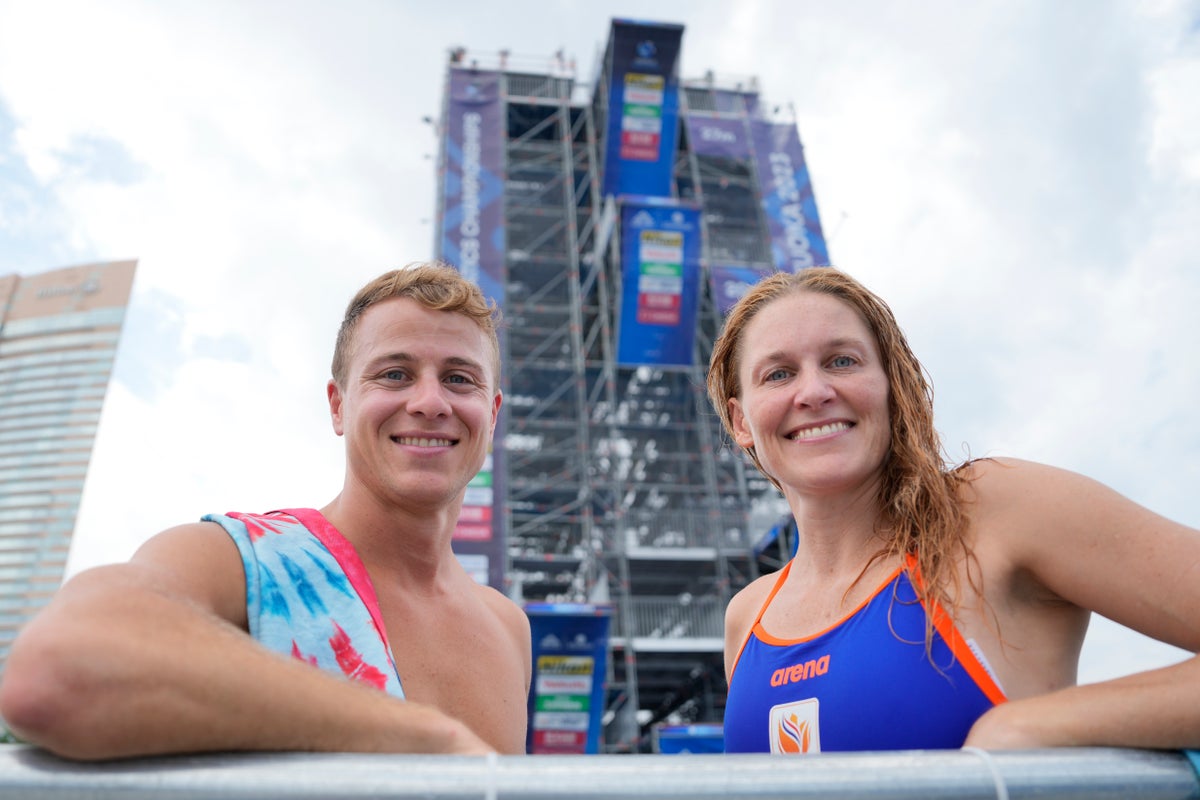
Matt Cooper has no illusions about the hazards of diving from a 27-meter platform — about 90 feet, or as high as a nine-story building — into the sea, a lake, or a diving tank.
“Even if it’s a good dive, the impact you have from 27 meters is like a car crash going 85 kilometers per hour (50 mph)," said Cooper, who's preparing for the high-diving competition this week at the World Aquatics Championships in southwestern Japan.
Cooper is dented up.
He pulverized his left heel in Australia diving into a pool that was too shallow. The heel's now fastened together with metal plates, screws, and rods.
In Switzerland he was rescued by scuba divers who pulled him unconscious from a lake after a belly flop.
“I basically landed on my chest and my chin and got an uppercut punch,” the American said. “I didn't get knocked out immediately. But I remember thinking — ‘Oh, that didn’t feel good.'"
His Dutch wife Ginni van Katwijk — yes, she's also a high diver competing this week in Japan — has her own injury file.
She tore ligaments in her left elbow doing a warm-up dive and needed Tommy John surgery, a procedure usually reserved for baseball pitchers. Or the day she was practicing a new dive, but came up short of perpendicular on the entry. Her face paid.
“I had two black eyes and a bruise under my chin and a bruise on my arm,” she said. “But I had to go back up again because I didn't want to be traumatized by that dive."
So why do they tease danger, test mortality, and threaten incapacity? Men in competition dive from 27 meters and women from 20 (66 feet). They land feet first. If they were diving in head first, the shoulders, the head and the neck could crumble from the impact.
“There is something in high diving that you can't get anywhere else in the world, and that's the adrenaline,” Matt said. “It's something that no other drug in the world can give you.”
Matt acknowledged that his parents have endured sleepless nights as their son and daughter-in-law tempt fate.
“They are supportive but they really don’t like what we’re doing,” Matt said of his parents, Bill and Nancy Cooper.
Ginni chimed in laughing. “I'm sure they blame me."
Matt said his father was watching on television when he was pulled limp out of the water in Switzerland.
“He probably went for a five-hour walk because he was so stressed,” Matt said. “So my parents are counting down the days when we'll be done.”
Of course it looks dangerous. But the sound is also terrifying when divers hit the water from high up. The loud crack at impact mimics a gunshot from a large caliber weapon.
“I hope they have good insurance,” said Yuko Matsuda, who helps run the diving venue.
Matt had the same reaction most people do when he first looked up at the platform or, worse yet, when he stood there and looked down.
“I went up at first and said there’s no way. I’ll just stick to the normal 10-meter (33 feet) platform, which most people think is high enough.”
Danger has another lure. Diving pays they bills — and then some.
For several years the two have worked for Royal Caribbean Cruises as featured performers in the ship's water shows. They met as collegiate divers — Ginni at the University of Houston and Matt at the University of Texas at Austin — and joined the show at the suggestion of a friend.
“After only eight months of dating we got a couples cabin on the ship, and we didn't kill each other," Ginni said. “If you can survive living in a crew cabin for 11 months, you can take on the world.”
With expenses paid on the ship, Ginni said they can put away their salaries to buy a house when their careers end. A big house.
“Plus, we were not ready for real-life jobs,” Ginni added.
The diving platform on the ship is only 17 meters (55 feet) but presents big problems if the sea churns and the water in the pool starts sloshing around.
“It gets very windy, but sometimes in the winter it can get very rocky,” Ginni said. “The water can literally flow out of the pool. So sometimes we have to modify or postpone the show because it's just too rough.”
Matt proposed in 2016 shortly after shattering his heel, and they married two years later. Ginni joked that he received her sympathy vote.
“I was basically on one leg so I had to propose on crutches," Matt said.
Matt had not yet graduated to diving off the 27-meter platform, still working at lower heights when he crushed his heel.
The injury, of course, pushed him higher.
“They told me I wouldn’t walk normally again,” Matt said. "I had to work my butt off in physical therapy and prove that I could walk and dive again.”
“That drove me to do my first 27-meter dive to show the orthopedic community that there are success stories out there," he added. "Then once you do one, you’re hooked.”







